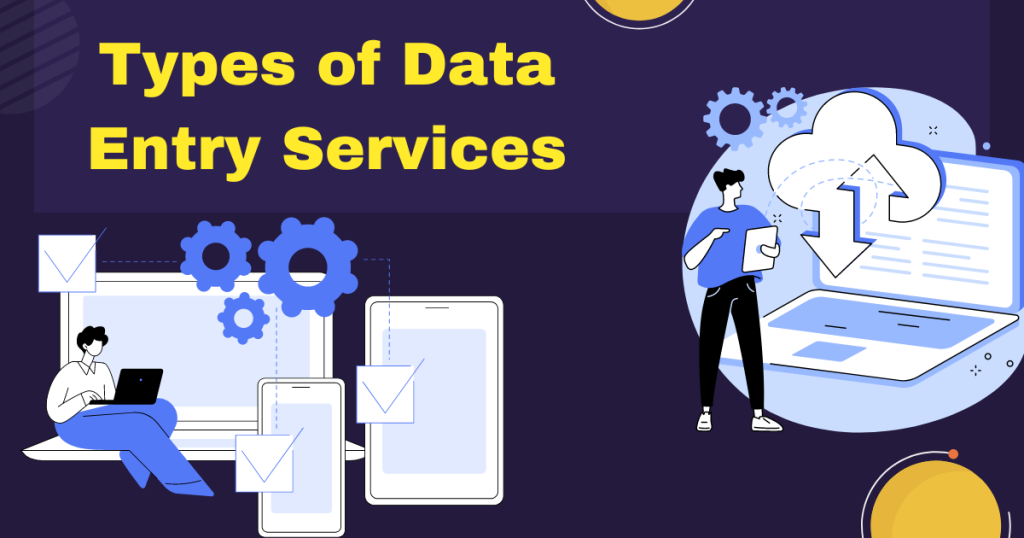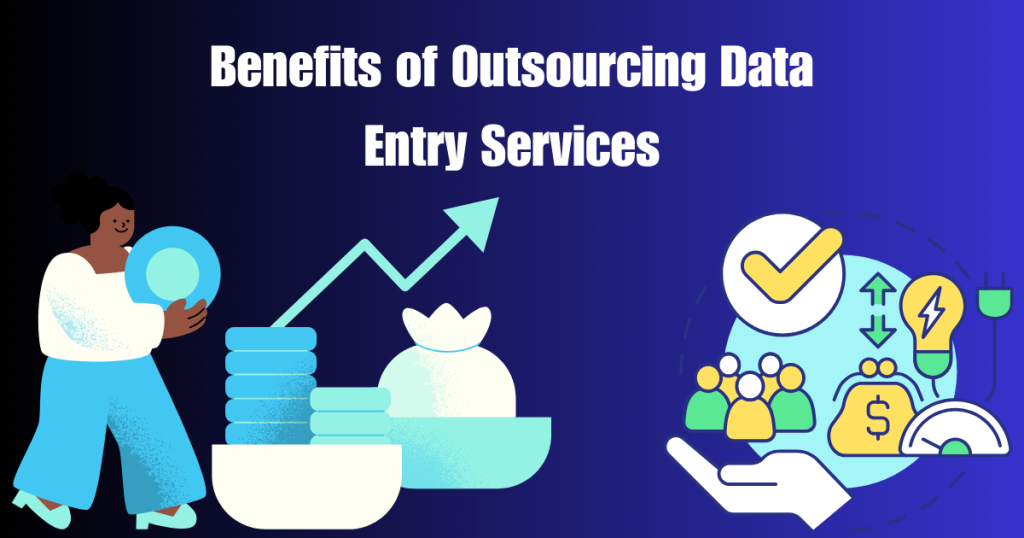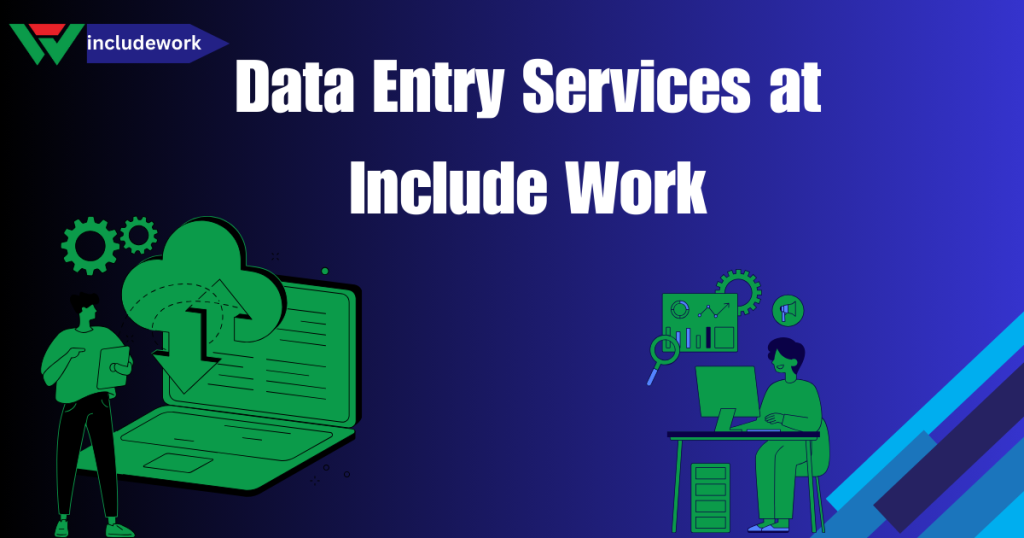In our fast-paced, connected world, the importance of Data Entry Services is often overlooked. However, it’s through careful data processing that businesses truly flourish.
Imagine a team working early in the morning, transforming raw data into valuable insights. They are focused, carefully working with numbers and text. Each piece of information is recorded accurately.
Table of Contents
Each precise dataset tells a story of dedication and attention. Every entry is treated carefully, recognizing its importance in keeping businesses running smoothly. This commitment is evident in the sound of keyboards, in the focused atmosphere, and in the shared satisfaction of work well done.
Data Entry Services are more than a business need. They represent the hard work and attention to detail crucial for success. In a world driven by data, these services are the unsung heroes of accuracy and efficiency. They ensure every decision is supported by trustworthy information.
Understanding Data Entry Services
Data entry services play a crucial role in contemporary business operations. They involve inputting data into computer systems or databases. While this task may seem routine, it is essential for organizational efficiency and data management. Despite its simple definition, the process encompasses a wide range of complex tasks.
Consider a scenario where every piece of information, from customer details to financial records, must be stored and organized. Data entry services excel in this realm. They not only gather data but also ensure its accurate entry and management. This facilitates easy access for decision-making purposes.

The rise of digital technology has evolved data entry from a traditional, paper-based task to a sophisticated, computerized process. The core objective, however, remains unchanged: to manage data, a critical asset for any business, with utmost accuracy and precision.
Why are data entry services so crucial? In essence, data equates to power. For businesses, well-organized data leads to informed decision-making, enhanced customer service, and potential growth. The precision of the data directly influences the quality of insights obtained from it.
Understanding data entry services goes beyond recognizing how data is inputted. It involves an appreciation of its vital role in business operations. These services are more than mere administrative tasks; they are an integral part of a company’s foundation.
Importance of Data Entry in Business
In today’s fast-paced business world, data entry holds a position of paramount importance. It’s not just a routine task; it’s a foundational element that supports various critical functions of a company. From small startups to large corporations, data is a key asset, and how it’s managed can significantly impact business outcomes.
Data Accuracy: The Heart of Business Operations
Accurate data is like a compass for a business. It guides decision-makers, helping them chart the right course. Imagine making strategic decisions based on inaccurate data – it’s like navigating a ship in treacherous waters without a map. Data entry services ensure that the information fed into business systems is correct, allowing for reliable analysis and decision-making.
Efficiency and Productivity
Efficient data entry processes streamline operations, reducing the time and resources spent on managing data. This efficiency translates into increased productivity across the board. For instance, well-organized customer data can enhance the effectiveness of marketing campaigns, leading to better customer engagement and higher sales.

Data-Driven Decisions
In the age of big data, businesses thrive on data-driven insights. The role of data entry in feeding accurate, timely data into analytical tools cannot be overstated. It’s the quality of this inputted data that determines the reliability of the outputs – the analytics and reports that shape business strategies.
Compliance and Record-Keeping
Many industries are governed by strict regulatory requirements regarding data management. Accurate data entry ensures compliance with these regulations, thereby avoiding potential legal and financial repercussions. Moreover, precise records are indispensable for audit trails and historical analysis.
Customer Satisfaction
At the end of the day, businesses exist to serve their customers. Efficient data entry services contribute to better customer relationship management by maintaining up-to-date and accurate customer records. This responsiveness to customer needs builds trust and loyalty, which are critical for business success.
Types of Data Entry Services
Data entry services are diverse and can be tailored to meet the specific needs of different businesses and industries. Understanding the various types of data entry services helps in choosing the right service that aligns with your business requirements. Let’s delve into some of the common types:
Online Data Entry
This involves inputting data directly into an online database, web-based application, or website. Online data entry is crucial for e-commerce businesses, which require constant updates to product listings, prices, and descriptions.
Offline Data Entry
Offline data entry is the process of entering data without an internet connection. This might include entering data from paper documents into digital formats, like spreadsheets or database systems, often used in legal and medical transcription.
Text and Numeric Data Entry
This is one of the most basic types of data entry, involving the input of textual and numeric information from various sources into a computer system. It’s widely used in invoice data entry, record keeping, and database updates.

Data Cleansing: Also known as data scrubbing, this service involves the correction or removal of incorrect, corrupted, duplicate, or incomplete data within a database. It’s essential for maintaining the quality of data.
Image Data Entry: This type of service involves converting data from images (like photographs, scanned documents) into a desired digital format. It’s commonly used in digitizing historical documents and archiving artwork.
Audio Data Entry: Here, data is transcribed from audio files. This service is vital for industries like journalism, law, and healthcare, where interviews, legal proceedings, and medical reports often need to be transcribed.
Handwritten Data Entry
This involves the transcription of handwritten documents into digital formats. It’s challenging due to the variations in handwriting but is crucial for digitizing historical records and personal documents.
E-book Data Entry
This service focuses on converting data into digital book formats. It’s not just about transcription but also involves formatting and preparing content for e-publishing.
Catalog Data Entry
Involves managing and updating product catalogs, which is particularly important for e-commerce and retail businesses to keep their online stores up-to-date.
Database Management and Data Entry
This comprehensive service involves not just entering data, but also managing, updating, and maintaining databases to ensure they are structured, efficient, and useful for the business.
Benefits of Outsourcing Data Entry Services
Outsourcing data entry services has become a strategic move for many businesses, big or small. This approach offers numerous benefits, making it an attractive option for companies looking to optimize their operations. Let’s explore the key advantages:
Cost-Effectiveness: Outsourcing can significantly reduce costs related to hiring, training, and maintaining an in-house data entry team. Businesses can save on salaries, infrastructure, and technology investments, paying only for the services they need.
Focus on Core Business Activities: By outsourcing data entry tasks, companies can redirect their focus and resources towards core business functions like product development, customer service, and strategic planning. It allows management to concentrate on growth and innovation rather than getting bogged down by routine tasks.
Access to Expertise and Advanced Technology: Outsourcing firms specialize in data entry and often have access to the latest technology and skilled professionals. This expertise ensures high-quality data processing, something that may be challenging to replicate in-house.
Enhanced Accuracy and Efficiency: Professional data entry services are equipped to provide a higher level of accuracy and efficiency. Their expertise in handling large volumes of data minimizes errors and improves the overall quality of data.
Scalability: Outsourced data entry services offer scalability to handle fluctuating workloads. Companies can easily scale up or down based on their data entry needs without worrying about the constraints of in-house resources.

Improved Data Security: Reputable outsourcing companies adhere to strict data security protocols to protect sensitive information. This aspect is especially important for businesses dealing with confidential or personal data.
Time Zone Advantages: Outsourcing to a company in a different time zone can provide around-the-clock operations. This continuous workflow ensures faster turnaround times, contributing to improved productivity and customer satisfaction.
Streamlined Processes: Outsourcing firms often bring in their own tried-and-tested processes for data management, leading to a more streamlined and organized approach. This can enhance the overall operational efficiency of a business.
How to Choose a Data Entry Service?
Selecting the right data entry service is a critical decision for any business, as it can significantly impact the efficiency and quality of your data management. Here are some key factors to consider when making this choice:
Experience and Reputation: Look for a service provider with a solid track record and good industry reputation. Experienced companies are more likely to understand the nuances of data entry and offer high-quality services. Checking reviews and testimonials can provide insights into their performance and reliability.
Data Security Measures: Data security is paramount. Ensure that the data entry service provider has robust security protocols in place to protect sensitive and confidential information. Inquire about their data handling, storage, and protection policies.
Accuracy and Quality Control: The accuracy of data is crucial. Ask about the service provider’s accuracy rates and quality control processes. Understanding how they manage and rectify errors will give you a sense of their commitment to quality.

Technology and Infrastructure: A good data entry service provider should have the latest technology and adequate infrastructure to handle large volumes of data efficiently. Check if they use advanced software and tools that align with your business needs.
Scalability and Flexibility: The provider should be able to scale up or down based on your business requirements. Flexibility in handling different types and volumes of data is a key aspect to consider.
Turnaround Time: Timely delivery is essential in data entry services. Assess the provider’s ability to meet deadlines and handle urgent projects. Faster turnaround times can significantly benefit your business operations.
Cost: While cost should not be the only deciding factor, it’s important to ensure that the pricing is reasonable and aligns with the market rates. Get a clear understanding of their pricing structure and check for any hidden costs.
Communication and Customer Service: Effective communication is crucial for any outsourced service. The provider should have a responsive customer service team and clear channels of communication to address any issues or queries promptly.
References and Past Projects: Request references or case studies of past projects similar to yours. This can provide a realistic view of their capabilities and the types of clients they have successfully served.
Potential Challenges with Data Entry Services
While data entry services provide numerous benefits, they also come with their own set of challenges. Addressing these issues is crucial for businesses to ensure smooth and efficient data management. Here’s a look at some common challenges and how to tackle them:
Data Accuracy and Quality: One of the primary challenges in data entry is maintaining high accuracy and quality. Errors can creep in, leading to incorrect data that can impact business decisions. Regular audits, quality control checks, and training for data entry professionals are essential to mitigate this risk.
Data Security and Privacy: With the rise in data breaches, ensuring the security and privacy of sensitive information is paramount. This challenge requires robust data protection policies, encryption, and secure data handling practices. Outsourcing to a service provider with a strong track record in data security is also crucial.
Managing Large Volumes of Data: Handling large datasets can be overwhelming, especially for businesses without the necessary infrastructure. Leveraging technology like automation and cloud storage, and working with providers who can scale their services, can help manage this challenge.
Keeping Up with Technological Advancements: The fast pace of technological change means that data entry methods and tools are constantly evolving. Staying updated with the latest trends and incorporating modern technology into data entry processes is important for maintaining efficiency.
Integration with Existing Systems: Ensuring that data entry services are compatible with existing business systems can be challenging. Customization and choosing a provider with expertise in integrating their services with various platforms can address this issue.
Dealing with Varied Data Formats: Data comes in various formats, and converting these into a uniform format for analysis and storage can be

challenging. A service provider with experience in handling a range of data types can be a valuable asset.
Language and Cultural Barriers: For global businesses, language and cultural differences can pose a challenge in data entry, especially when outsourcing to providers in different countries. Choosing a provider with multilingual capabilities and cultural competence is key.
Turnaround Time and Cost: Balancing the cost of data entry services with the need for timely delivery is a common challenge. Clear communication about expectations and finding a provider that offers a good balance between cost and efficiency is vital.
Tips for Finding High-Quality, Reliable Data Entry Services
Finding a high-quality and reliable data entry service provider is crucial for ensuring that your data is handled professionally and accurately. Here are some tips to guide you in selecting the best service for your needs:
Assess Your Data Entry Needs: Before you start looking for a service provider, clearly define your data entry requirements. Understand the type of data you need to be processed, the volume, and the specific services you require. This clarity will help you find a provider that matches your needs.
Research and Shortlist Providers: Conduct thorough research to identify potential data entry service providers. Look for companies with a good reputation, positive reviews, and relevant experience. Shortlist the ones that meet your criteria.
Check for Experience and Expertise: Experience matters in data entry. Choose a provider with proven expertise in your industry or in handling the type of data you have. Experienced providers are more likely to understand your specific challenges and needs.

Evaluate Data Security Measures: Data security is non-negotiable. Ensure that the provider has stringent data security policies and practices in place. Ask about their data handling, storage, encryption, and privacy policies.
Look for Accuracy and Quality Control Procedures: High accuracy is critical in data entry. Inquire about the provider’s accuracy rates and their quality control processes. Understanding how they manage and rectify errors will give you a sense of their commitment to quality.
Consider the Technology and Infrastructure: Check if the provider uses the latest technology and has the necessary infrastructure to handle your data entry needs. Advanced technology can significantly improve the efficiency and accuracy of data entry.
Review Pricing and Flexibility: Compare pricing but also consider the value offered. Look for a provider that offers flexible services tailored to your needs and can scale up or down as required.
Evaluate Communication and Customer Support: Good communication is essential, especially when outsourcing. Choose a provider who is responsive, transparent, and has strong customer support.
Ask for References and Samples: Request references or case studies of past projects, and consider asking for a sample of their work. This can provide insights into their capabilities and the quality of their services.
Read the Contract Carefully: Before finalizing a provider, carefully read and understand the contract. Pay attention to the terms of service, confidentiality agreements, and any clauses related to service levels and penalties.
How an Agency Can Help You With Data Entry Service?
Enlisting the services of a professional data entry agency can greatly benefit your business in handling and managing data efficiently. Here’s how an agency can assist:
Professional Expertise: Agencies specializing in data entry services have trained professionals who are skilled in handling a variety of data types. They bring expertise that ensures high accuracy and efficiency in data processing.
Advanced Technology and Tools: Such agencies often have access to advanced data entry tools and technologies. This includes software for faster data processing, automation tools for repetitive tasks, and secure systems for data storage and transfer.
Customized Solutions: A data entry agency can offer customized solutions tailored to your specific business needs. They can handle diverse data types, from simple text to complex numerical data, and adapt their processes to suit your requirements.
Data Security and Confidentiality: Agencies are typically equipped with robust security measures to ensure the confidentiality and safety of your data. They adhere to strict data privacy policies and are often compliant with international data protection standards.
Scalability: One of the significant advantages of working with an agency is scalability. They can adjust the volume of work according to your business needs, handling peak times and scaling back when necessary.
Time and Cost Efficiency: Outsourcing to an agency can save time and reduce operational costs. They handle the recruitment, training, and management of data entry personnel, allowing you to allocate resources more effectively.

Quality Control: Agencies implement rigorous quality control processes to ensure the accuracy of data. Regular audits and checks help in maintaining high-quality standards.
Focus on Core Business: By taking over the data entry tasks, agencies allow you to focus on your core business activities. This can lead to better resource allocation and strategic planning.
Handling of Large Volumes: Agencies are equipped to manage large volumes of data efficiently. This capability is especially beneficial for businesses that generate a lot of data regularly.
Enhanced Productivity: With an agency handling the time-consuming task of data entry, your team can focus on more productive activities, thereby enhancing overall business productivity.
Future Outlook for Data Entry Services
The future of data entry services looks promising, with several trends and advancements shaping the landscape. Understanding these can help businesses prepare for upcoming changes and leverage these services more effectively. Here’s a glimpse into the future outlook for data entry services:
Increased Automation and AI Integration:
Automation and artificial intelligence (AI) will soon play a larger role in data entry. Technologies such as machine learning and natural language processing will simplify the data entry process. They will increase accuracy and lessen the need for manual input.
Enhanced Data Security Measures:
As data breaches become more prevalent, the focus on data security will intensify. Data entry services will likely adopt more advanced security protocols and technologies to protect sensitive information.
Cloud-Based Data Management:
Cloud computing will continue to influence data entry services. More businesses are likely to adopt cloud-based data management solutions for their flexibility, scalability, and cost-effectiveness.

Growing Demand for Specialized Services:
There will be an increased demand for specialized data entry services tailored to specific industries or types of data. This specialization will allow for more accurate and efficient data handling.
Emphasis on Quality and Accuracy:
As data becomes more integral to business operations, the emphasis on the quality and accuracy of data entry will grow. Service providers will need to enhance their quality control processes to meet these higher standards.
Expansion of Remote and Freelance Workforces:
The trend of remote and freelance workforces in data entry is likely to continue. This model offers flexibility and access to a broader talent pool.
Integration with Business Intelligence Tools:
Data entry services will increasingly integrate with business intelligence and analytics tools. This integration will allow for more seamless data processing and quicker access to insights.
Enhanced Customer Service:
With competition in data entry services increasing, providers will focus more on customer service and client satisfaction. Personalized services and improved client support will become key differentiators.
More Collaborative Approaches:
Collaboration between data entry service providers and their clients will become more crucial. Providers will work closely with businesses to understand their specific needs and challenges.
Focus on Ethical Data Practices:
There will be a growing focus on ethical data practices, including how data is collected, used, and shared. Transparency and ethical considerations will become integral to data entry services.
Why Choose Our Data Entry Services?
Choosing the right data entry service provider is crucial for any business that values the integrity and usefulness of its data. At Include Work, we offer a compelling case for why businesses should select our data entry services. Established in 2012, our experience and commitment to excellence set us apart in a crowded marketplace.
Here are some key reasons why Include Work stands out:
Expertise and Experience: With over a decade in the industry, our team has honed its skills to perfection. The 54 professionals working with us are not just data entry operators; they are experts who understand the nuances and complexities of various data formats and requirements.
Customized Solutions: We recognize that no two businesses are the same. Our approach is to provide customized data entry services that align with the specific needs of each client. Whether it’s large-scale data entry projects, detailed data analysis, or specialized data processing, we tailor our services to meet your unique requirements.
Quality and Accuracy: At the heart of our services is an unwavering commitment to quality. We understand the ramifications of inaccurate data, which is why we have stringent quality control processes in place. Our focus is on delivering data that is not just accurate but also meaningful and actionable.

Data Security: In an age where data breaches are commonplace, data security is a top priority. Our robust security protocols ensure that your data is protected at every stage of the data entry process. We employ the latest security measures to safeguard your data against any potential threats.
Technology and Innovation: We leverage cutting-edge technology to enhance our data entry services. From advanced software to AI-assisted tools, our technological capabilities allow us to handle large volumes of data efficiently while maintaining high accuracy levels.
Customer-Centric Approach: Our clients are at the heart of everything we do. We pride ourselves on our responsive and flexible customer service. Our aim is to not just meet but exceed client expectations, forging long-term partnerships based on trust and mutual success.
Conclusion
Data entry services are crucial for modern business. They offer many benefits like cost savings, improved efficiency, and better data quality. These services, including automated data entry, specialized tasks such as image or audio data entry, and database management, are essential for accurate and efficient data handling.
Selecting the right data entry service is vital. This choice should be based on your business needs, focusing on data security, provider expertise, technology, and scalability. The right service aligns with your business goals and needs. It streamlines data management, boosts efficiency, and lets you concentrate on core business activities.
The future of data entry services looks promising, thanks to automation, AI, and cloud computing. These technologies are set to enhance efficiency and accuracy further, offering businesses new ways to use their data strategically.






